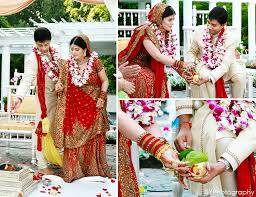The Types of Wedding according to Hindu Shastra – Hindu Vivah

According to the ancient vedic culture there are mainly five legitimate types of wedding. Brahma, Daiva, Arsha, Pragaptya, & Gandharva. The rest forms of wedding that don't have recognization in the society are Asura, Rakshasa, & Paisaka. Gandharva vivah was recognized by the Kshatriyas and Vaishyas where as in a Brahmin Community it wasn't accepted.
Brahma vivah
A bride when married to a suitable Groom through a formally allied proposal is called as a "Brahma vivah".
In normal terms its referred to as "Arranged Marriage".
Daiva vivah
A bride when married to a Groom in return for a service or favour done by him regardless of the bride's consent, its termed as "Daiva vivah".
In ancient vedic period this kind of wedding was referred to an act where a maiden was offered to a Priest as a token of religious sacrifice.
Today such kinds of weddings are arranged under obligation of the Groom demanding the Maiden, in return for the help provided by him to her family without her consent. This can be even true for a Groom where he is forced to marry a maiden obliged by the favour done by the Bride's family towards his family.
Arsha vivah
The wedding where the maiden's guardian receives a gift in return for offering her as a bride to the groom is termed as "Arsha vivah".
Today such kinds of weddings are token of business alliances and deals in the business class families where individual consent from both Bride and Groom aren't considered. The Bride and Groom here are considered as the Social Gifts exchanged among the two families.
Pragaptya vivah
When a groom achieves a maiden as a bride on a demand put forth towards her family, without necessarily feeling a need to request for her consent, such a marriage is termed as "Pragaptya vivah".
Today such weddings are arranged on a proposal put forth by a highly regarded family towards the Maiden's family without necessarily considering her consent, but the social status of the family.
Gandharva vivah
When a Chap and a Maiden decide to unite in a sacred long term committed relationship, without the consent of Parents or Guardians, then such a wedding is called as "Gandharva vivah".
In general terms its referred to as "Love Marriage" which may or may not follow the Wedding Commandments.
Asura vivah
If a guardian sells a Maiden to a Groom then such a marriage is called "Asura vivah".
Today its not called as wedding, in fact the chap purchasing a maiden isn't necessarily a groom. This action is a darker side of the society that's ruining the social harmony, we pretend to stay away from such actions, but its the fact that just staying away won't be the solution.
Rakshasa vivah
If a Maiden is forcibly obtained under obsession for a marriage by a Chap then such a wedding is called as "Rakshasa vivah".
This action is widely attempted today which is an outcome of obsession. A Maiden is forced to marry a Chap under obligation or a threat put forth by him, just because he wants to possess her.
Paisaka vivah
If a Maiden is unconsciously embraced by a male in her sleep without her consent, then a relationship formed in such a manner is called "Paisaka vivah".
It's not considered as a wedding, neither the relationship is considered to be legitimate, but the fact still lies that the maiden who is victim is disregarded and abused by the society, and not the punk who has stole her virginity.
From the above the legitimate forms of weddings acceptable to the society are Brahma, Daiva, Arsha, Pragaptya, & Gandharva.
No comments:
Post a Comment